What is Chengyu Chinese idioms
Chengyu, Chinese idioms, are a kind of traditional Chinese idiomatic expressions. They are derived from ancient literature and most of which consist of four characters. Chinese idioms are often closely linked with the myth, story or historical fact from which they are derived.
There are about 5000 Chinese idioms in the Chinese language, but some dictionaries list over 20,000. Today, Chinese idioms are still taught in school and used in daily conversation.
Why learn Chinese idioms?
Chinese Idioms are not easy to understand without any explanation. The main thing to learn from Chinese idioms is not the story but rather the moral behind the story. Why learn Chinese idioms? Well, firstly, if you want to be fluent in Chinese, knowing at least 100 to 300 Chengyu will help you greatly in understanding the Chinese language. Secondly, knowing Chinese idioms makes you understand the Chinese culture better as many of these Chengyu are derived from Chinese ancient history.
10 common Chinese Idioms
There are at least 5000 Chinese Idioms in the Chinese language, which one should you learn? I guess it will be useful to start from those commonly used in daily conversation. The Chinese idioms listed are greatly used in newspaper and movies.
半途而废 bàn tú ér fèi
The English translation of this Chinese Idiom is to give up halfway. The first two Chinese words 半途 [bàn tú] means half way in English. 废 [fèi ] in English translation is to give up or throw away.
做任何事情都必须坚持到底,不能半途而废。
Zuò rèn hé shì qíng dōu bì xū jiān chí dào dǐ, bù néng bàn tú’ ér fèi
No matter what you do, you must endure to the end and not give up half way.
一五一十 yī wǔ yī shí
Literal translation of this Chengyu is one five and one ten. What does it mean actually? Well, the actual meaning is to explain or relate what has happened in details.
彼得把车祸的经过一五一十的告诉了警察。
Bǐdé bǎ chē huò de jīng guò yī wǔ yī shí de gào sù le jǐng chá
Peter told the police everything he knows about the car accident.
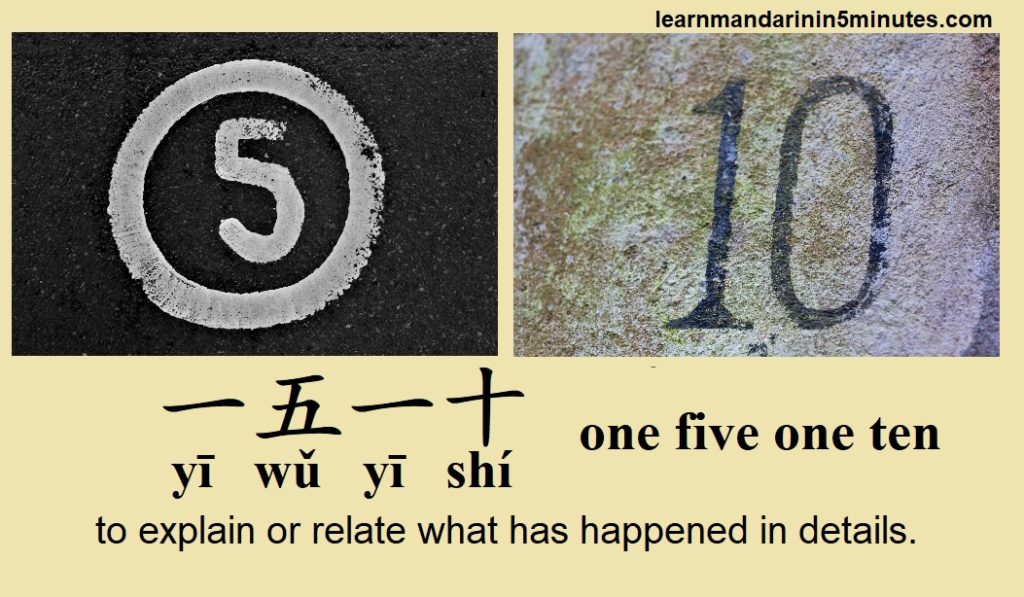
自相矛盾 zì xiāng máo dùn
The Chinese word 矛 [máo] is actually a spear, and the Chinese character 盾 [dùn ] is a shield. These two tools are in contrast with each other. 自相 [zì xiāng ] is thus the English meaning for one another or each other. The meaning of this Chinese Idiom is to contradict each other.
他的解释有很多自相矛盾的地方。
Tā de jiě shì yǒu hěn duō zì xiāng máo dùn dì dì fāng
His explanation has many contradictory areas.

一无所有 yī wú suǒ yǒu
As you may already know by now, 一 [yī] in English is one and 无 [wú ] in English is nothing or do not have. As for 所有, [suǒ yǒu ] when translated to English has the meaning of to possess or to own. The Chinese idiom 一无所有 [yī wú suǒ yǒu] is thus the meaning of not having or possessing anything.
他除了身上穿的衣服之外可以说是一无所有。
Tā chú le shēn shang chuān de yī fú zhī wài kě yǐ shuō shì yī wú suǒ yǒu.
He has nothing except those clothes he is wearing.
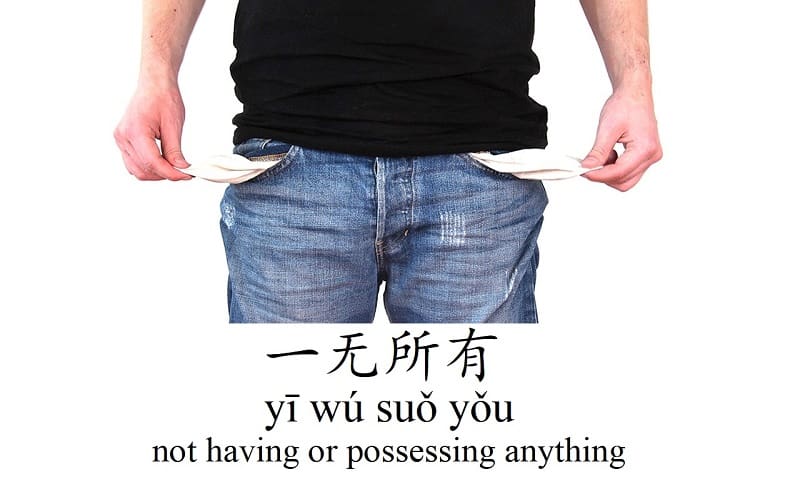
倾盆大雨 qīng pén dà yǔ
I am sure you have heard this Chinese idioms spoken many times in daily conversation. It is talking about the rain. The Chinese words大雨 [dà yǔ ] means big rain, if we were to translate it literally. 倾 [qīng] is the act of tilting the container so as to pour, whereas 盆 [pén] is the container that holds the water. So when the rain is heavy, you can use this Chengyu倾盆大雨 [qīng pén dà yǔ] to describe heavy downpour or raining cats and dogs.
外面下着倾盆大雨。
Wài miàn xià zhe qīng pén dà yǔ.
There is a heavy downpour outside.
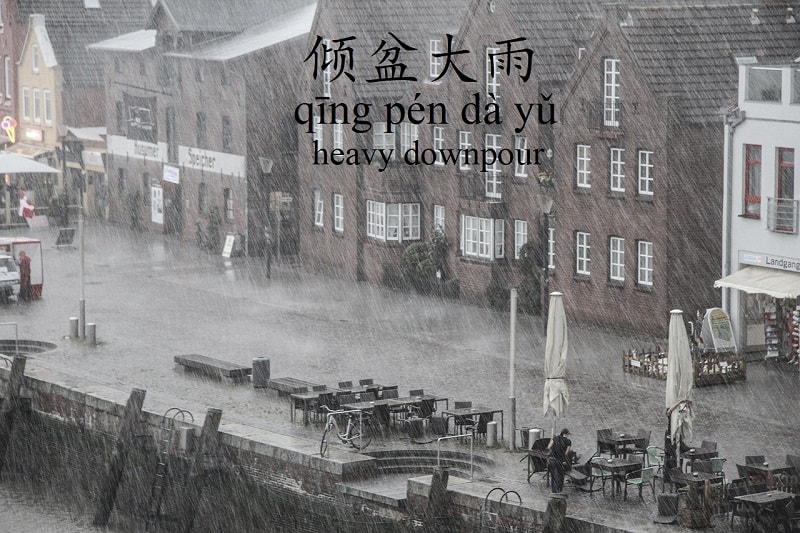
一见钟情 yī jiàn zhōng qíng
一见钟情 is to love at first sight in English. 一见 is first sight / to see for the first time, whereas 钟情 [zhōng qíng] is to focus your love. When you fall in love with someone at first sight, this Chinese idiom is most appropriate to use.
我对你一见钟情。
Wǒ duì nǐ yī jiàn zhōng qíng.
I have fallen in love with you at first sight.
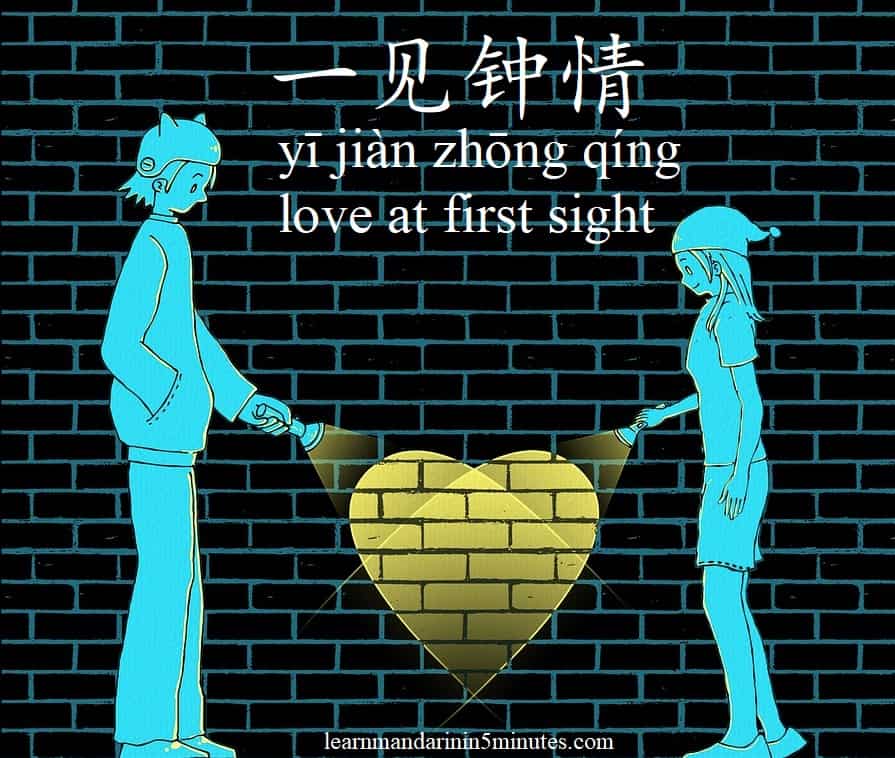
乱七八糟 luàn qī bā zāo
I have used this Chengyu many times to my brother because his room is always in a mess. When a place is in a mess, this Chengyu comes in handy. You may wonder why this Chengyu is seven and eight and not five or six. Well, this Chengyu has a historical meaning to it. The 乱七 [luàn qī] refers to the chaos of the seven countries during the Western Han period, and 八糟 [bā zāo] is the chaos of the eight kings during the Western Jin period.
弟弟把房间弄得乱七八糟。
Dì dì bǎ fáng jiān nòng dé luàn qī bā zāo.
My younger brother has messed up his room.

自作聪明 zì zuò cōng míng
Are there any smart alecks in your neighbourhood? When someone says you are 聪明 [cōng míng], it is a compliment. 自作聪明 on the other hand is not a compliment at all. Therefore, don’t act smart when you are not.
我最讨厌自作聪明,自以为是的人。
Wǒ zuì tǎo yàn zì zuò cōng míng, zì yǐ wéi shì de rén.
I hate smart alecks and those who are full of themselves.
爱不释手 ài bù shì shǒu
Have you ever like or love something so much so that it is very difficult for you to put it down or let it go? If you have, this Chinese idiom describes exactly how you feel. The literal translation is “love no let go”.
彼得对新买的智能手机爱不释手。
Bǐdé duì xīn mǎi de zhì néng shǒu jī ài bù shì shǒu.
Peter can’t get enough of his newly bought smartphone.
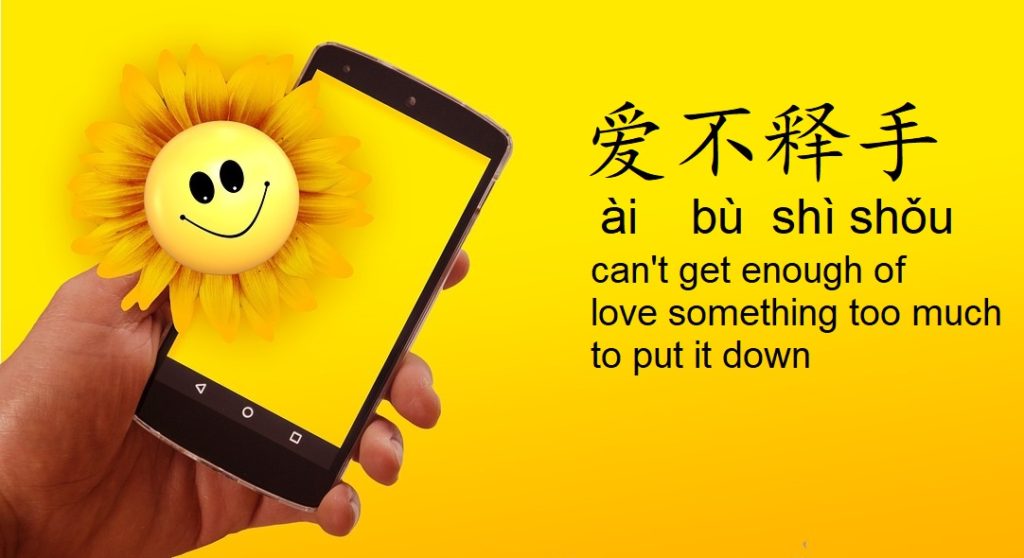
省吃俭用 shěng chī jiǎn yòng
If you are a person who scrimp and save, you should have heard people using this Chinese idiom on you. 省吃 [shěng chī ] is to save on eating, and 俭用 [ jiǎn yòng ] is to use frugally, to skimp, not to waste unnecessarily.
这些钱是他省吃俭用存下来的。
Zhè xiē qián shì tā shěng chī jiǎn yòng cún xià lái de.
The money is saved by living frugally.
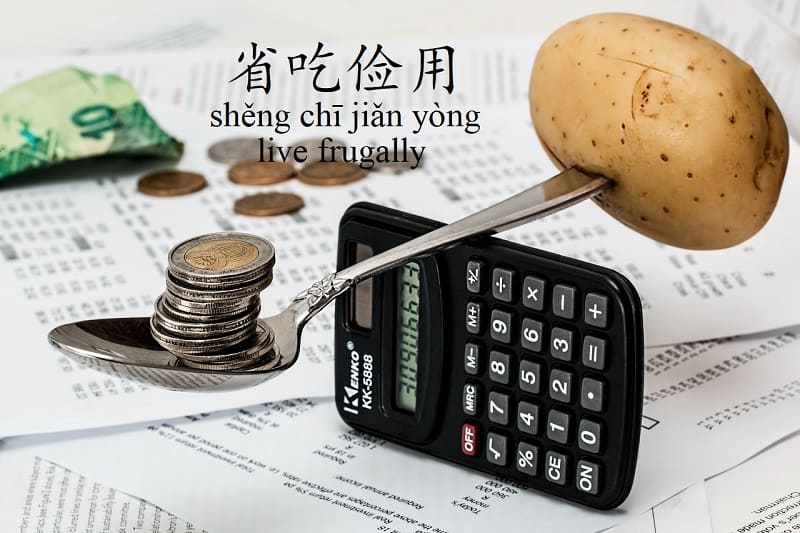
If you are interested to learn more about Chinese idioms, do leave us a comment. We will list up more in our future posts.
